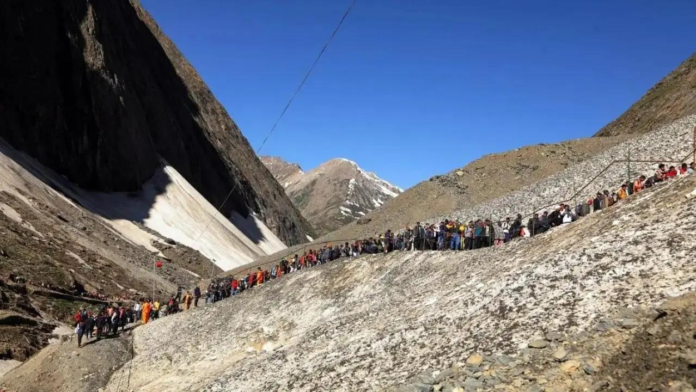The annual pilgrimage to the revered Amarnath Cave Shrine, located in the Anantnag district of Jammu and Kashmir, is set to commence on Thursday, July 3. The trip, which is taken by lakhs of devotees every year, is one of the most spiritually significant journeys among Hindus.
The holy cave shrine, an abode of Lord Shiva, is situated at an altitude of around 13,000 feet from the sea level, and pilgrims have to undergo an arduous trek to reach the temple. This year, helicopter services for Amarnath yatra have been suspended for security reasons, and devotees will have to cover the journey on foot or by ponies or palkis (palanquins).
Given the challenging terrain that one has to cross to reach the shrine, it is extremely important to be physically fit and follow some health essentials to ensure safety and well-being.
One of the most pertinent health challenges that can affect pilgrims during the trek is high-altitude sickness, which presents symptoms like nausea and vomiting, fatigue, dizziness, shortness of breath and increased heart rate. It is essential to watch out for warning signs and seek immediate medical attention if these symptoms are observed. Moreover, one should take steps to prevent or reduce chances of facing health issues.
In view of the same, Shri Amarnathji Shrine Board has listed some tips on their website, which include steps to prepare for the challenging trek and prevent high altitude sickness as well as health essentials to following during the trip.
Here are some important points from the advisory:
Before the trip
Physical fitness: Start preparing for the trek days in advance. It is advised to start walking around 4-5 km every day in the morning or evening, at least a month prior to the yatra. Additionally, do deep breathing exercises and yoga, particularly pranayama, for improving oxygen efficiency of the body.
Medical test: It is important to consult your physician before heading for the high elevation journey, especially if your have pre-existing medical conditions.
During the trip
Walk slowly: During the trek, walk slowly while ascending and take time to acclimatise with the elevation and environment. Take regular breaks and avoid overexertion.
Stay hydrated: Keep drinking water to combat dehydration and headaches. Do not consume alcohol or any caffeinated drink during the journey.
Consume carbs: Consuming carbohydrates can reduce fatigue and prevent low blood sugar levels.
Portable oxygen: Carry portable oxygen as it can be helpful in case one has difficulty in breathing.
Don’t ignore symptoms: Don’t ascend any further if you experience discomfort or notice symptoms of high-altitude sickness. Instead, descend immediately to a lower elevation. Contact nearest medical centre for professional assistance.


